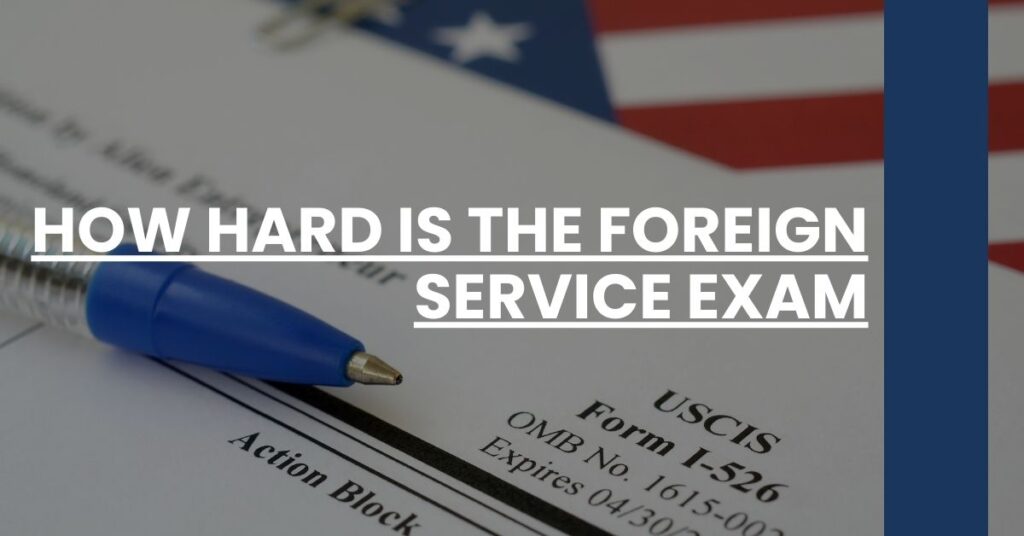How hard is the Foreign Service Exam remains a pressing question for many aspiring diplomats.
- Exam Structure: Evaluates the multifaceted FSOT, revealing its comprehensive nature.
- Pass Rates: Discusses historical statistics to gauge the exam’s difficulty level.
- Preparation Tips: Offers pragmatic strategies to conquer the notorious FSOT.
Navigating how hard the Foreign Service Exam is just got easier.
- Overview of the Foreign Service Officer Test (FSOT)
- The Rigorous Nature of the Examination Process
- Statistical Pass Rates and Historical Difficulty
- Comparing FSOT with Other Government Service Exams
- Essential Skills and Knowledge Areas Assessed
- Study Strategies and Preparation Tips
- Real Candidate Experiences and Advice
- Additional Resources and Support for Aspirants
- Frequently Asked Questions
- Conclusion and Moving Forward After the FSOT
Overview of the Foreign Service Officer Test (FSOT)
If you’re eyeing a career in the U.S. Foreign Service, the FSOT stands as the gatekeeper to your ambitions. Often shrouded in mystery, many aspiring diplomats find themselves pondering, “How hard is the Foreign Service Exam?” The simple truth is that the FSOT is designed to be challenging, but with the right mindset and preparation, it is entirely within reach.
What the FSOT Encompasses
The FSOT is a comprehensive assessment used by the U.S. Department of State to evaluate the qualifications of candidates for Foreign Service Officer positions. It’s the first hurdle in a multi-stage selection process that filters for the top candidates capable of representing U.S. interests abroad.
Here’s what you need to tackle in the FSOT:
- Job Knowledge: Covering topics from economics to world affairs, this section measures your understanding of complex global issues.
- English Expression: Showcasing your ability to effectively communicate in English.
- Situational Judgment: Evaluating your problem-solving abilities and judgment in relevant, real-world scenarios.
- A Written Essay: Demonstrating your capacity to construct a persuasive argument under time constraints.
Gather more insights on the process by exploring the State Department’s FSOT Information and Selection Process, where registration details and test structures are clearly outlined.
The Importance of Being Thoroughly Prepared
Passing the FSOT isn’t about cramming facts the night before; it’s about demonstrating a wide-ranging understanding that you’ve cultivated over time. That’s why any strategy for approaching the FSOT should include consistent, dedicated study and a commitment to staying well-informed about world and national affairs.
The Rigorous Nature of the Examination Process
Understanding the exacting nature of the FSOT helps to demystify why this exam is considered tough. It’s not merely about what you know; it also examines how you think and how effectively you can communicate your thoughts.
The Multi-part FSOT Journey
- Initial Written Exam: A computer-based test that screens candidates on their knowledge and judgment.
- Personal Narrative Questions (PNQs): This is where you demonstrate your experiences that align with the 13 Dimensions sought after by the State Department.
- Oral Assessment: If you advance, you’ll undergo a rigorous interview process that challenges how you react under pressure and work with others.
Surviving this gauntlet requires more than simple memorization. It requires agility of thought, diplomacy in communication, and strategic preparation.
Reflecting on the Statistics
Given that only about 20-30% of test-takers pass the FSOT, you can appreciate the level of difficulty inherent in the exam. However, it’s important to remember that while the numbers might seem daunting, each individual’s chances can significantly improve with disciplined study habits and recognition of the test’s high standards.
To understand the implications of these pass rates, consider the insights from Path to Foreign Service, a guide curated by a former FSOT taker.
Statistical Pass Rates and Historical Difficulty
When trying to measure “how hard is the Foreign Service Exam,” one might look at the historical FSOT pass rates as a metric. Since its inception, the FSOT has maintained a reputation for being a tough nut to crack.
Navigating the Odds
While the FSOT has had pass rates that hover around the 30-40% mark, it’s crucial to approach this figure with determination rather than intimidation. Several variables, such as individual preparation, background knowledge, and even test-day conditions, can influence your outcome.
Keep in mind that statistics are not destiny. Arm yourself with comprehensive study materials, like the well-regarded FSOT Study Guide Review, to improve your chances.
Adapting to Changes
The Foreign Service Exam has evolved over time. In the past, there was a strict minimum score for passing, but recently the board has moved away from this system. Instead, they aim to holistically assess each candidate, which means that while thorough preparation remains key, there’s also room to showcase your unique strengths.
Expand your understanding of the exam’s evolution and how it affects your preparation by reviewing recent stipulations by American Foreign Service Association.
Comparing FSOT with Other Government Service Exams
To place the difficulty of the FSOT in context, it’s beneficial to compare it with other competitive government service exams.
The FSOT in the Broader Landscape
- While each exam has its own challenges, the FSOT is especially renowned for its breadth and depth. It requires not just memorization, but also the ability to apply knowledge in analytical and situational contexts.
Dive deeper into the comparison by examining the details of the FSOT’s unique structure available through Pearson VUE, which administers the test.
Essential Skills and Knowledge Areas Assessed
The FSOT assesses a wide berth of skills and knowledge, part of what contributes to its notorious difficulty. To excel, you must display competence across multiple disciplines and possess a toolkit of intellectual and communicative skills.
Areas You’ll Be Tested On
- U.S. Government and Politics: Understand the structure and function of your own government.
- World Affairs and History: Display a grasp on historical events and their present implications globally.
- Economics: showcase the ability to navigate economic principles and their real-world applications.
- Communication Skills: Prove you can articulate ideas clearly and persuasively.
For an in-depth look at the subject matter covered, refer to the official FSOT Information Guide, which specifies the knowledge areas and offers sample questions.
Sharpening Your Edge
Given the diverse subjects tested, your preparation should be both broad and deep. Make the most of resources like Path to Foreign Service, which can illuminate the content areas and offer strategies on how to handle the wide-ranging material presented in the FSOT.
Remember, conquering the “how hard is the Foreign Service Exam” question is a matter of preparation, and the thorough understanding of the world around you. Embrace the challenge, and let your preparation be your guide to passing the FSOT with flying colors.
Study Strategies and Preparation Tips
Cracking the FSOT requires more strategy than brute force. Knowing how hard the Foreign Service Exam is, the right approach to studying can be the difference between passing and failing. Infuse your study routine with tactics that seasoned FSOT veterans and experts agree on.
Map Out Your Study Plan
Good strategy begins with good planning. Outline your study topics and allocate time based on your strengths and weaknesses. Make sure to:
- Schedule Regular Study Times: Consistency leads to better retention. Reserve specific hours each day dedicated to studying.
- Diversify Your Materials: Use a mix of textbooks, online resources, and news sources to cover the exam’s extensive material base.
Drill Down on Key Areas
The FSOT is less about memorizing facts and more about understanding concepts. Enhance your mastery over critical areas by incorporating these tips into your routine:
- U.S. Government and Politics: Gain insights from the American Government CliffsQuickReview to solidify your foundational knowledge.
- World Affairs and History: Absorb world history timelines and stay current with international news.
- Economics and Mathematics: Brush up on economic theories and basic math concepts that often feature in the exam.
- English Communication: Refine your writing and verbal communication skills. Books geared towards the FSOT can be excellent practice.
Practice, Practice, Practice
Practice is pivotal, especially with an exam as demanding as the FSOT. Consider the following:
- Take Practice Exams: Get a feel for the real test by attempting FSOT practice questions.
- Review Your Mistakes: Analyze your practice exams to understand where you went wrong and take steps to improve.
Utilize Online Forums and Support Networks
Connect with fellow aspirants and access shared wisdom to enrich your preparation strategy. Engage with communities such as the FSOA Yahoo Group where members exchange insights and advice.
Real Candidate Experiences and Advice
Nothing beats real-world experience when assessing how hard the Foreign Service Exam is. By tapping into the collective wisdom of those who’ve tread this path, you’re able to calibrate your prep approach to mirror successful patterns.
Harvest Wisdom from the Trenches
To gain unfiltered perspectives, delve into personal accounts of past FSOT candidates. These narratives offer a treasure trove of tactical and moral support. Here are key takeaways:
- Endurance is Key: Many underscore the importance of endurance throughout the marathon of exams and evaluations.
- Preparation Diversity: Successful candidates recommend a broad preparation scope, emphasizing the need to stay informed on current global and national issues.
Discover detailed experiences like the one shared in What Diplomats Do for more personalized strategies and insights.
Emulate Successful Habits
Synthesize advice from those who’ve succeeded:
- Read Widely: A broad knowledge base is indispensable. Consistently consume a variety of books, journals, and current event resources.
- Time Management: Learn to manage your exam time effectively, an often-cited challenge by those who’ve sat for the FSOT.
Additional Resources and Support for Aspirants
Embarking on the FSOT demands a wealth of resources. Fortunately, a plethora of study aids and preparatory materials are at your disposal.
Curate Your Study Toolbox
Supplement your studies with quality resources:
- Comprehensive Guides: Source guides like those offered by Path to Foreign Service to serve as your navigation aids through the FSOT’s extensive content.
- Mock Exams: Utilize online platforms to find practice tests that emulate the FSOT’s structure and format.
Remember, selecting the right resources will shape how effectively you internalize the vast knowledge mandatory for the FSOT.
Frequently Asked Questions
How many times can you take the FSOT?
You can take the FSOT once every 12 months. If you don’t pass, use the time to recalibrate your study approach and deepen your knowledge.
How long should I study for the FSOT?
Typically, candidates commit several months to a year of preparation. Devote time proportionally across various knowledge areas to build a solid foundation.
What kind of job knowledge is tested on the FSOT?
Expect questions on American society, government, history, culture, and more. A command over world geography, economics, and communication principles is also crucial.
Conclusion and Moving Forward After the FSOT
Navigating how hard is the Foreign Service Exam shouldn’t be a walk shrouded in trepidation. It is a challenge, yes, but one that’s surmountable with perspicacity and grit. Your journey toward joining the ranks of the U.S. Foreign Service could be one of the most rewarding experiences of your life. With a targeted study strategy, informed by expert tips and reflective of successful candidates’ advice, you’ll be better positioned to embrace this challenge.
Engage rigorously with the material, tap into the support networks available, and view the FSOT not as a daunting barrier but as an opportunity to prove to yourself—and ultimately to the world—the caliber of your dedication and abilities. With this mindset, you’re already a step closer to your goal. The question “how hard is the Foreign Service Exam” will then shift from a query of doubt to a challenge you’re ready to meet head-on.
Discover how hard the Foreign Service Exam is with insights on pass rates, preparation tips, and candidate experiences.

